Russian media Sputnik and RT (Russia Today) Balkans operating in Serbia, are used as propaganda tools by Putin’s Russia and represent Russian “soft power” in the region. This propaganda from Moscow, disseminated through the contents published by both Russian media outlets and republished by Serbian media, reaches, and is read everywhere in the Western Balkans, including in North Macedonia. Our interlocutors, who know the situation quite well, say that Russian propaganda finds fertile soil owing to the emotional ties and Orthodoxy, and the perception of the Russians as our brothers helping us in the most difficult times
Russian media Sputnik and RT (Russia Today) Balkans operating in Serbia, are used as propaganda tools by Putin’s Russia and represent Russian “soft power” in the region. This propaganda from Moscow, disseminated through the contents published by both Russian media outlets and republished by Serbian media, reaches, and is read everywhere in the Western Balkans, including in North Macedonia. Our interlocutors, who know the situation quite well, say that Russian propaganda finds fertile soil owing to the emotional ties and Orthodoxy, and the perception of the Russians as our brothers helping us in the most difficult times
Author: Vesna Kolovska
The war in Ukraine showed that propaganda and disinformation are equally important weapons as the actual weapons, for which Russia will spend 5 percent of its annual budget in 2024. Well-known narratives, such as the anti-NATO, anti-LGBT, the denazification of Ukraine, and measures against COVID-19, are used and circulated from Russia to the entire region via Serbia.
If we open the Serbian versions of the Kremlin propaganda websites of Sputnik and Russia Today (RT), which have been operational for years on the territory of our Northern neighbor, and search the contents on the topic “Ukrainian laboratories for biological weapons financed by the USA,” Sputnik will show you as many as 136 articles, and on Russia Today – RT 16. The headlines and their respective contents will show you everything and nothing – that the Russian Army had reported that former US President Barack Obama and his State Department had promoted military biological programmes in the USA and abroad, that in biological laboratories near the Russian borders the US was creating infection hotspots, including that Russia claimed that an independent international inquiry was necessary due to US military-biological activities… and so on indefinitely.
Production of laboratory-related topics increasing since 2022
All these headlines and a full series of others reviewed were produced within 8 months, i.e., from April until the end of 2023. As you delve deeper into the past, the headlines start to become repetitive, saying that the USA did not create entirely biological weapons in these alleged biological laboratories on the Russian border, but only components for biological weapons. Furthermore, as we approach the beginning of 2023 and throughout 2022, headlines mentioning the Coronavirus start to appear. Thus, headlines suggest that the USA was involved in the emergence of the COVID pandemic, and that Russia claimed that there was a possibility for the Coronavirus to have been artificially enhanced from one strain to another, including the claim of the Russian Army that the variant of the virus with a 80 percent mortality rate was created in the USA, etc.
And not just for Covid. For every epidemic on the planet, the blame is somehow pinned on the USA – starting from the occurrence of HIV in the 1980s, including Crimean fever and monkeypox.
Going further back to March and April 2022 – immediately after the onset of the Russian aggression against Ukraine – a flood of headlines related to the alleged Ukrainian or American laboratories for biological weapons can be noted. Out of the 136 articles on this topic on Sputnik, as many as 57 (on average, almost one per day) were published in April and March 2022. In March 2022, not a single day went by without some headline on this topic, with 10 March being the leading with as many as 7 articles published.
However, if we look at the period from August 2019 to March 2022, only 10 articles cover this topic. How did this topic suddenly become relevant, coinciding with the onset of Russian aggression against Ukraine? According to the publishing schedule of articles on this topic, it appears that the alleged bio-laboratories in Ukraine suddenly emerged on the world stage at the same time with the aggression against Ukraine, while previously very little was written about them. Eight months before the Russian aggression, there were no articles, and previously, from 2019-2021, the way this topic was reported was completely different.
Be that as it may, this story has been known for decades. Back in 1991, the Bush Senior Administration approved 700 million Dollars aid to prevent the nuclear weapons of the Soviet Union from falling into the hands of undemocratic countries or terrorists, and later the topic expanded to include chemical and biological weapons from the former USSR, leading to the opening of the special Office of Cooperative Threat Reduction in the US State Department.
However, the sudden coverage of the laboratory-related topic by Russian state-owned propaganda media was not the only phenomenon. The same trend can be observed in the use of the word “Nazis” (supposedly referring to the Nazis in Ukraine) and the word “genocide” in Russian state-owned media. As the aggression against Ukraine began, the use of these two words in Russian state-owned media also exploded, similar to the example with the Ukrainian bio-laboratories.
Disinformation and propaganda channels
Serbia became the centre of Russian propaganda eight years ago, through the opening of Radio Sputnik Serbia and RT Balkan just a year ago. Both media outlets are managed by Ljubinka and Jelena Milinčić, daughter and mother considered to be pioneers of the Russian media presence in the Balkans. Both media operate as online portals, while according to the reports, RT Balkan is expected to evolve into a television channel in 2024.
We currently have a website which, of course, is less successful than the Sputnik website, but television is the goal… RT is seen as Russia’s modern child. When we started the television, we did not work with Soviet apparatchiks but brought in people from CNN and BBC who taught us how to work. Russia adopted these Western operational means and later realized that a media war was ongoing for which we had no weapons. We were winning that war, but if you ask me whether we are winning it now, you would be asking me why Russian athletes did not won medals at the Olympic Games. Well, because they did not, said for RTS Jelena Milinčić, Chief Editor of RT Balkan, in March 2023 for RTS.
Even before assuming the editorial role in the Serbian RT, Milinčić worked for the Spanish Department of Television. In this interview, she did not deny that the media in the Balkans are open to advocating Russian interests. She said that with her mother, Ljubinka Milinčić, the Editor of Sputnik, they had an agreement for RT to serve the interests of younger audiences, while Sputnik targets the older public.
RT does not have a large audience – it has 70,000 followers on Facebook and 29,400 on X (Twitter), unlike Sputnik, which has 1.4 million followers on Facebook. However, the ambition is to open a television channel, whereas, as Jelena Milinčic put it – a broadcasting license will, undoubtedly, be obtained.
On 15 December 2023, on the Russian state-owned television, Margarita Simonyan, Editor-in-Chief of RT, from Moscow announced the launch of the channel in Serbian language in Republika Srpska. Announcing the channel’s opening in the Serbian enclave in Bosnia and Herzegovina, which acquired the status of EU candidate-country after many years followed just one day after Russian President Vladimir Putin said that it was a pity that Russian media were not present in Bosnia and Herzegovina, when replying to a journalist’s question from Bosnia.
RT and Sputnik – rich editorial teams with popular columnists
RT’s portal in Serbia has podcasts and many well-known and regionally popular columnists – from Nele Karajlić, the frontman of the former Sarajevo rock band “Zabranjeno Pušenje,” to the prominent Serbian journalist Ljiljana Smailović, who represents her right-wing conservative views. She also hosts a show on RT where she interviews right-wing politicians and other conservative public figures. Frequent guests on her show include names like director Emir Kusturica and nationalist poet Matija Bečković. RT collaborates with the Serbian right-wing political scientist Slobodan Antonić, a professor at Belgrade’s Faculty of Philosophy, who “admires the character and deeds of the former Serbian leader Slobodan Milošević, for whom he also wrote a book”, reported Serbian media. Among the collaborators is also Serbian priest Darko Đogo, known for his nationalist and chauvinistic columns in various pro-Russian media in the region.
The interlocutors with whom we spoke with said that RT and Sputnik are two of the richest editorial teams in Serbia, with the highest-paid journalists.
Sputnik has been managed by Ljubinka Milinčić in Serbia for eight years. She is present on the website with a podcast providing an overview of the most important weekly events.
For example, in the podcast dated 6 December 2023, Ljubinka Milinčic provided an overview of the events from the beginning of the week. The overview covered the entire region and it concluded with the following information from Macedonia:
Ljupčo Palevski, the murderer of his own daughter was arrested. They believe that the citizens of Skopje want to lynch him, for such people the death penalty should be reinstated, news that clearly disinformed.
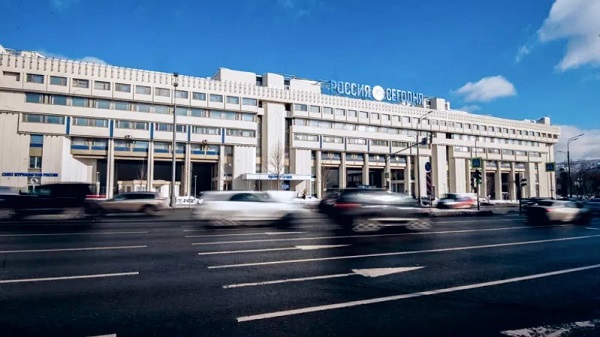
Sputnik is an international media group brand of Rossiya Segodnya offering websites in 32 languages, radio broadcasts in 19 countries, as well as news in English, Chinese, Spanish, Arabic, and Farsi languages. RT is part of an autonomous nonprofit organization – ANO TV Novosti, an agency with a budget of 1.88 billion rubles for 2024. Novosti was founded by the Russian state-owned News Agency RIA Novosti and is funded by the Kremlin.
Unlike RT, which does not have a masthead, nor known authors, and only an email for contact, Sputniknews.com is transparent. RT’s domain data is protected.
Regarding the work of RT and Sputnik on the international level, the Russian Federation does not spare funds. In 2022, the state allocated approximately 143 billion Rubles (1.9 billion US Dollars) from the Federal Budget for mass media, and 1.6 billion US Dollars for 2023 for propaganda to disseminate pro-Kremlin narratives inside and outside the country.
Most of the funds allocated for the media by the Central Budget (over 51%) went to the All-Russian State Television and Radio Broadcasting Company (VGTRK), the largest Russian media company controlled by the Russian Government and includes a large number of television and radio channels, as well as RT.
In 2023, VGTRK received 25.8 billion Rubles to expand pro-Kremlin content to national viewers in Russia, while RT received a slightly smaller amount compared to 2022 due to the sanctions imposed on Russia after the invasion of Ukraine, thereby terminating broadcasts in the EU, Canada, US, and UK. The medium also closed its offices in several countries.
On the other hand, RT is strengthening its presence in Serbia and plans to open an office in Africa. Therefore, the budget for 2024 for RT was increased to 1.94 billion Rubles.
The third medium with the highest amount of state funding is channel Zvezda, a media network managed by the Russian Ministry of Defense, with contents intended to boost the morale of Russian troops on the front. For this year – 2024 – a budget of 1.59 billion Rubles has been allocated for this channel.
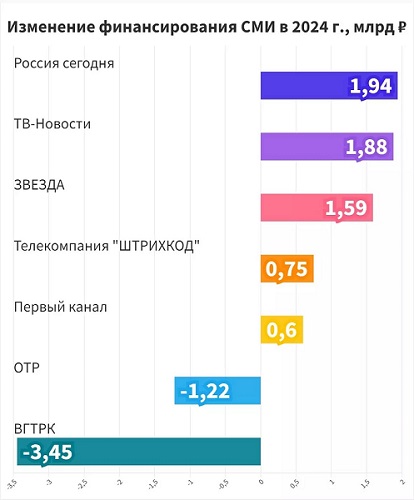
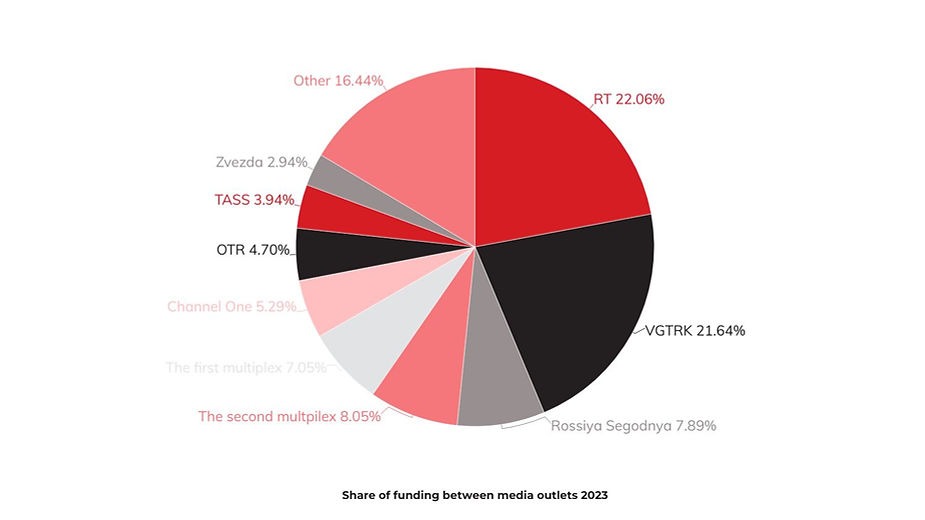
With a Serbian license, RT briefly broadcasted in Germany despite the ban
Although RT was banned in the European Union countries, on 16 December 2022, Russian television began broadcasting programs on its website through the broadcasting license obtained in Serbia from the Regulatory Authority for Electronic Media (REM). However, it was quickly shut down. Vuk Vuksanović from Belgrade Security Forum said that Serbia is occasionally used for minor circumvention but has limitations because the ruling elites have restricted cooperation in such delicate situations, especially – as he puts it – if they feel they can lose power, or if that will put them in direct collision with the West. That is when the Serbian elite decided not to go further.
Vuksanović explains the presence of RT, which was announced in Serbia as early as 2015.
In 2015, there was an idea to open RT, but it failed because it was not an interesting enough area, especially since national media circulate pro-Russian narratives themselves. Then Al Jazeera and BBC started broadcasting in Serbian language. Radio Sputnik appeared at that time, and Serbian media took over contents free of charge, thus unwittingly enabling the spread of international news with a mild dose of Russophilia. Radio Sputnik was not necessarily the most popular medium, compared to local media, influenced by the local elite. RT Balkan did not open as a TV channel, but a media portal and came to Serbia at a time when RT was closed in many European countries and partially in Hungary, showing that Russia was not erased everywhere in Europe,” said Vuksanović.
He estimated that Russia is not popular in the region because of what it is, but because of what it is not – and that is not being the West. The position of Vuksanovic was that the influence of Russia in the region was exaggerated and that it was always limited and presented through skillfully used limited instruments of influence, those being: gas, unresolved Kosovo issue, and soft power. Russia is popular among the population, especially in the Serbian community, and that is quite impressive.
After the start of the conflict in Ukraine, a fact emerged that people often overlook – Russian predispositions in the Balkans are not military, nor political. Besides gas, Russian challenges are also not economic, as Europe is the largest economy partner of the countries in the Balkans. However, Russian influence in the Balkans is of emotional nature, as it presents itself in the field of the hearts and minds. Russians became the symbol that filters and manifests dissatisfaction with the West, that parts of the population feel. As for Macedonia, I heard information that Russian popularity has grown due to frustrations with the EU and the way Macedonia is treated. On the other hand, Serbian pop culture is popular and comes through TV Pink. Extremely positive narratives about Russia and its leadership can be heard on these TV stations, like Pink. As a side effect, Russian popularity is growing even in countries like Macedonia, explains Vuksanović.
However, despite the presence of RT and Sputnik, the main breeding ground for pro-Russian sentiment, specifically in Serbia, and perhaps in the Balkans, are the tabloids controlled by local elites, Vuksanović estimated.
From Russia with love
Belgrade at almost every step shows its emotional ties to Putin’s Russia. At the main promenades in the Serbian capital, almost at every step, there is some memory of that emotional connection. From Hotel Moscow in the center, the path takes you to the restaurant Tsar Nikolai, passing by a souvenir kiosk – you see a magnet with Putin’s face next to Serbian kings. A poster for an exhibition of Russian ceramics hangs on the wall.
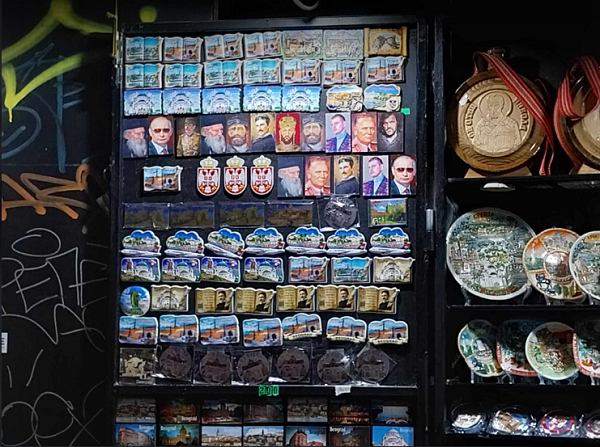
Playing hot-cold of the Serbian government with Russia and the EU made the country a center for numerous disinformation and pro-Kremlin narratives. This was also responded to by the European Commission in the Progress Report on Serbia as a candidate country.
The political and economic influence on the media remains worrying. Serbia needs to take urgent measures to resist anti-EU narratives propagated by numerous media, as well as, to oppose foreign manipulation with information and interference, especially in context of Russia’s aggressive war against Ukraine, specifies the EU Report on Serbia.
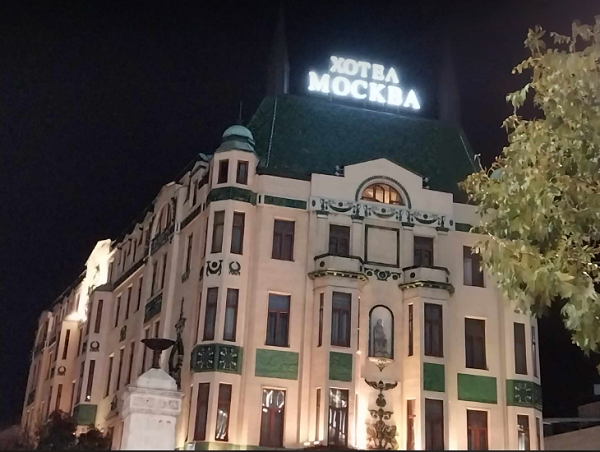
Samorukov: No big difference between Pink TV and RT
Speaking about the use of RT as soft power of the Russian Federation, Russian Maksim Samorukov, a fellow at the Carnegie Center, said that this medium had a propagandistic purpose and expected its influence in the region to grow. He assessed that RT will inevitably provide Russia with more opportunities to circulate its propaganda in the region, but still, the role of local media should not be underestimated, since they offer much more instrumentalized content. Or more specifically, as he said, “There is no big difference between Pink TV and RT”.
According to Samorukov, Russian media are present in the region with a familiar goal – to attack European values and win over as many states as possible from the West under its influence.
The goal of these attacks is to reduce the attractiveness of the West… to make them anti-Western and Eurosceptic, because Russia believes that the united West is a threat to Russia’s geopolitical global interests due to political interests. In the case of Europe, if you separate the European states from this united concept of the West, it would be much easier for Russia to deal with them one by one, because Russia’s negotiating position would be much stronger separately with any European state, especially with smaller countries, assessed Samorukov.
Business relations
Serbia obtains the cheapest Russian gas in the region. In 2022, Serbia signed a three-year agreement with Russia to supply gas at favorable prices. The largest Serbian company, NIS, is controlled by the Russian Gazprom. Due to the sanctions, there has been a change in the ownership, and Gazprom lost dominant ownership. Nevertheless, Serbia is reducing its dependency on Russian energy and recently joined the gas pipeline that carries gas from Azerbaijan.
Montenegro’s tourism depends on the Russians, who arrived through the airport in Belgrade last Summer. After the Serbians, the Russians are the second largest group of tourists in Montenegro, a NATO Member-State and EU accession country.
Republika Srpska has been approved for the construction of the Brod Gas for supplying Russian gas. The leader of Bosnian Serbs, Milorad Dodik, is lobbying to join the TurkStream Gas Pipeline.
Contrary to the propagandistic narratives imposed by pro-Russian media, Western Balkan data shows that the largest trading partner for the Western Balkans in 2022 was EU Member-States, with a trade exchange of 66 percent, while Russia accounted for only with 4 percent and China with 8 percent.
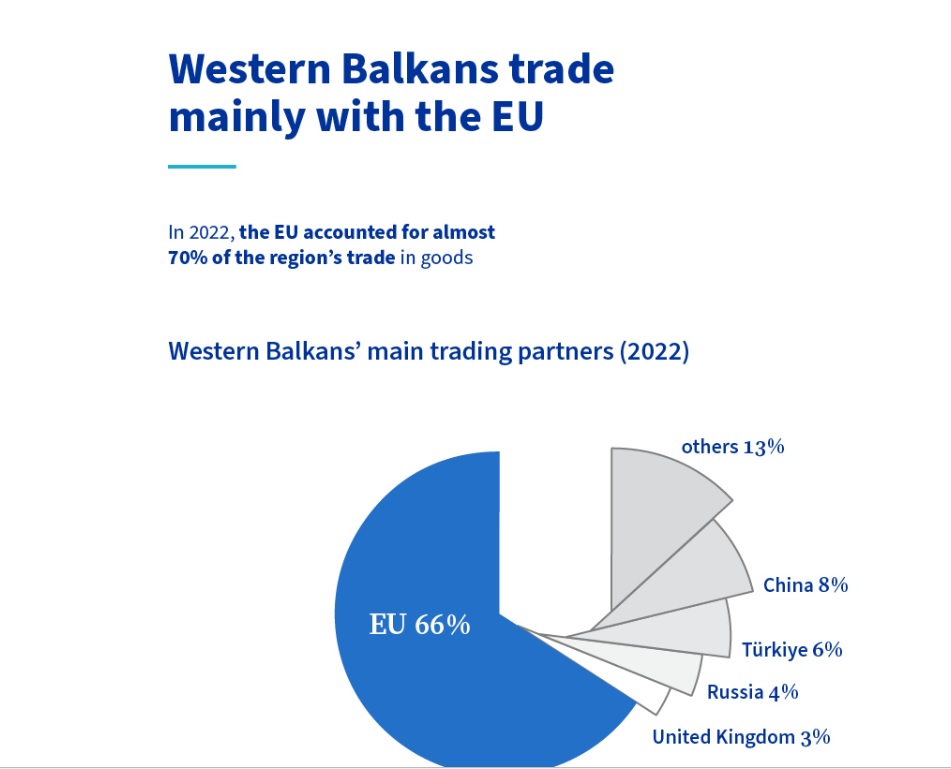
Propaganda, spies and money for influence – Money is the most difficult to prove
How does this Russian influence affect the Macedonian state and democracy? There have been talks about financing small right-wing parties in North Macedonia and the region for several years now. People close to Russian President Putin were seen in public events organized by parties such as “Edinstvena Makedonija” (United Macedonia) led by Janko Bačev and some right-wing movements. Proving the entry of “Russian money” into these parties and movements, however, Samorukov considers difficult to prove.
Firstly, the financial situation of political groups in Macedonia is not transparent and very difficult to say with certainty that this group is directly funded by the Kremlin. These parties only hope to receive funding from the Kremlin and try to present themselves as a very useful channel for Kremlin influence in North Macedonia. In addition, we know examples where pro-Russian slogans are promoted in anticipation of receiving money from Russia. I think what we know for sure is that the Kremlin has funded a large number of groups in the Balkans, stated Samorukov
However, according to him, paying politicians and injecting money into political parties ended with the entry of Macedonia into NATO.
Hence, I do not expect more. We know that Russian financing of Balkan parties reached its peak a few years ago with NATO enlargement here, and now Russia’s interest is smaller, especially considering how much Russia is spending on the invasion of Ukraine. I do not think that Russia has such a spare capacity to invest here. I do not know; I cannot say for sure whether “Edinstvena Makedonija” (United Macedonia) receives funds from Russia. Either it receives a great deal, or symbolically, or it receives other forms of support. Maybe yes, maybe no, but I do not think that would really change the game, says Samorukov.
He believes that getting funds from Russia is now much more complicated because the Russian financial system is isolated from the West and the EU. It is very difficult to transfer money to any European country, and therefore things are much more complex for pro-Russian groups in the Western Balkans.
The actions of right-wing parties and movements are observed by domestic security and intelligence services. When asked whether right-wing extremism was linked to Russia, National Coordinator for Preventing Violent Extremism and Combating Terrorism, Zlatko Apostoloski, said that “those connections were insignificant”.
There may be certain business interests or relations left from the past period. Today it is difficult to find a direct connection of any association with Russia after the events, the war in Ukraine. I do not think such a thing exists. Considering that we are also a NATO-member, the monitoring of these trends is heavily covered by security and intelligence services. So, during this period, we really have not shown any serious connection to any right-wing organization, neither from the region of Serbia, Bulgaria, nor from Russia with certain right-wing organizations in Macedonia, which would significantly disrupt the security situation, said Apostoloski.
That said, however, the thorn of Russian propaganda remains a tool for use.
Russian intensified operations in N. Macedonia started after 2008
Disinformation and propaganda particularly intensified after the war in Ukraine. They are not new in the region and go hand in hand with the activities of Russian diplomacy. A long analysis by Bellingcat quotes a Macedonian counterintelligence briefing from 2017, stating that over the previous nine years, the country had been “undergoing strong subversive propaganda and intelligence activity implemented through the Embassy of the RF”. The Russian operations started in 2008 when Macedonia was blocked from joining NATO due to its name dispute with Greece. “The document, prepared for Vladimir Atanasovski, the Director of the Macedonian Security and Counterintelligence Service (UBK), continues:
By using the assets and methods of so-called “soft power,” as part of the strategy of RF in the Balkans, the goal is to isolate the country [Macedonia] from the influence of the West, reported Bellingcat.
Also, here is part of the analysis by Dimitar Bechev, who explains the function of
the Russian “soft power”.
Russia uses many different instruments to assert its interests: hard military power, manipulation of economic ties, interference in other countries’ internal affairs and targeted information campaigns to influence public opinion. Interference in domestic politics is far from rare. A case in point would be the support Russia has given to nationalist activists in pro-EU and NATO countries such as Montenegro and North Macedonia. Peaceful political action (anti-government demonstration) could spill over in violence. Other examples of soft coercion, practiced in the post-Soviet space and in the Balkans, include trade embargoes and cyberattacks. (Dimitar Bechev).
According to what has been seen so far, it does not take much effort to achieve that soft-power, especially with disinformation and propaganda. Nikola Petrović, director and founder of the ISAC Foundation from Belgrade, says that the simplest channel for transmitting such pro-Russian narratives are the politicians.
If you have a politician with a Russian narrative, and you have those kinds of politicians throughout the region – in Montenegro, Serbia, Bosnia and Herzegovina, Macedonia – that is a simple channel for spreading the narrative. In times of crisis, the number of those who offer simple solutions increases. People have had enough of complicated, long, and difficult solutions, but unfortunately, real solutions, both in personal and political life, are the more difficult and demanding ones. But the right-wing structures offer easy solutions. And right-wing politicians adore Russian politics, although only a few understand what Russian or Chinese politics is about. Those who do not have concrete and realistic solutions fight against the West, against liberalism, against liberal solutions that bring more freedom because they feel threatened. That is the paradigm of democracy, which has people who feel threatened if someone has more freedom. Therefore, right-wing movements that fight against democratic Western values, fight against them by supporting Eastern or Russian and Chinese narratives, said Petrović.
Social networks as a channel for spreading Russian narratives
Portals and social networks are the main channels for spreading pro-Russian narratives. German journalist Thomas Brei, in a publication for the Friedrich Naumann Foundation, lists 12 explicit Russophile profiles, whose owners and editors advocate distinctly anti-Western narratives, highlight the relationship between Serbs and Russians who “should build a special relationship.
Russia sees itself as the antithesis of the European Union in the region and supports any initiative that seems suitable for undermining the desired EU integration of the Western Balkan countries, specifies the preface of the analysis, which begins with the data that even if the EU was the largest economic partner, Russia is presented as the largest economic supporter of the region, which is complete disinformation.
The second very important channel for spreading disinformation and conspiracy theories in the region is the social networks – Facebook and Instagram. Debunk.org analysts found 1,339 groups and pages on Facebook that regularly spread such content. These channels “operate” on the territory of the former Yugoslavia. As estimated, the almost complete absence of regulation of social networks creates a perfect environment for the production and rapid dissemination of incomplete and false contents directly to the public.
One of the authors of this publication is Daniela Vukčević and she concludes that most of the disinformation about Russia and the war in Ukraine has been imported from Serbia. Even the contents of disinformation, spread in regional Facebook groups in Croatia, Macedonia, Montenegro, Bosnia and Herzegovina, come through Serbia directly from Russia.
What is happening is simplification, and those narratives are being repeated. At the beginning of the conflict, 99 percent came from two media, – always online, not printed, and from electronic media. They hardly have their own contents, so they copy from Sputnik and RT. Sometimes they specify it as their own source, sometimes they identify the source as Sputnik. That, however, is not a source – it is literally copied from word to word. Disinformation is also spread by individuals, influential figures, politicians, those who spread anti-LGBT narratives, right-wingers, and those who absolutely do not hide their support for Russia, says Vukčević.
The authors of the publication analyzed over 4,000 Facebook accounts, including groups. The search narrowed down to the four most common pro-Russian narratives and found that the same content was copied and literally transferred to all countries in the region. Then, this content was spread and ended up in portals and social media accounts that cannot be controlled. Vukčevic claims that we all are susceptible to disinformation, and that the Western Balkans is a particularly fertile ground for pro-Russian narratives.
In this region Russia has a historical and mythical position, in the sense that we imagine Russia as the big brother. Here, Russia is presented as a protector of Orthodox Christians, and hence we are particularly susceptible since we imagine the West as the archenemy, with different values and views than ours, while Russians are the big brothers. There have been attempts to impose a stance on China as well, but that failed because China is far away, and we imagine it as an economic giant, the savior that will build our roads and infrastructure, says Vukčević.
The publication states that in 2022, only 650 examples of incomplete and false contents were identified. With a detailed review, the material can be divided into three groups depending on their main motive/logic for disinformation related to the war in Ukraine.
The language barrier only delays the flow of disinformation
As unbelievable as it may sound, Serbia is the place where some of the disinformation on the Albanian society originates from. The language barrier slows down the flow of disinformation for a day or two, but it does not stop it. Research of Albanian language media about Russian disinformation narratives starts from the list of disinformation distributed by the Kremlin’s media ecosystem and published in the EUvsDisinfo database in the first eight months of 2022. Of the 384 disinformation cases revealed by EUvsDisinfo through monitoring media in 15 languages from January to August 2022, 86 (22 percent) were circulated in the Albanian language media in Albania, Kosovo, and North Macedonia.
Main source of disinformation is Serbia, and disinformation come from Russia. Unlike Northern Kosovo, Macedonia, and Bosnia and Herzegovina, we have a small language barrier, but disinformation mainly comes from Russia through Serbia and spreads throughout the Balkans. The main narrative is against the West. After the war in Ukraine began, the main narrative was the denazification of Ukraine, American laboratories with chemical and biological weapons, and these narratives were disseminated via conspiracy theories on social media such as Facebook and Instagram, but also in traditional media. We have a problem in Albania – there are 800 portals – and it is difficult to know or investigate the ownership, leading to the potential flow of disinformation from Russia, said Aimona Vogli, editor at Faktoje, Albania.
What can be expected in North Macedonia and the Balkans?
Maksim Samorukov, who spent several years in Belgrade, says that the situation will not change much from what we have now, reminding us that the Kremlin’s attention to the events in Macedonia and the region was several years before NATO took control.
This was the culmination of Kremlin’s and Putin’s interest in Macedonia. We really invested a great deal in changing the mood here, changing public opinion. But now, I think that after Macedonia became a NATO Member-State, interest decreased significantly. Yes, there is some level of information circulating here, but it is more usual and regular, and I do not think it will culminate in the course of the elections. I believe it will continue as it is. But again, it’s not just the Russian propaganda that brought Fico to power in Slovakia or made Geert Wilders victorious in the elections in The Netherlands. They did not win the elections for anti-Ukrainian slogans. They won, primarily, because the economic situation became very difficult for the Dutch society, for the Slovak society, and I think the situation in Europe, including Macedonia, is deteriorating. The number of economic problems is piling up, and the chances were that we would see unexpected outcomes even without Russian propaganda. Even the smallest amount of Russian interest can contribute a great deal. Yes, inflation is high, prices are increasing, there is an economic recession… all these reasons can hardly lead to improvement, said Samorukov.

All comments and remarks regarding this and other Vistinomer articles, correction and clarification requests as well as suggestions for fact-checking politicians’ statements and political parties’ promises can be submitted by using this form
